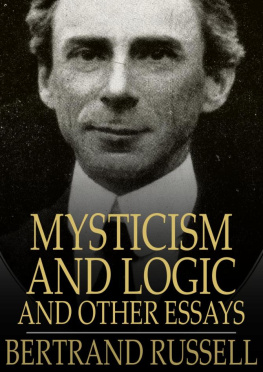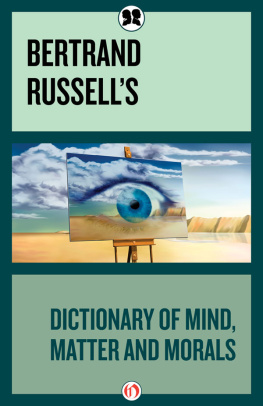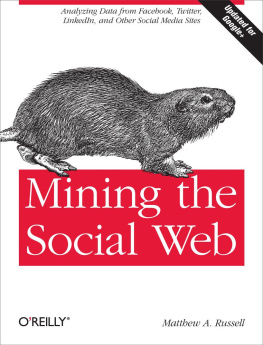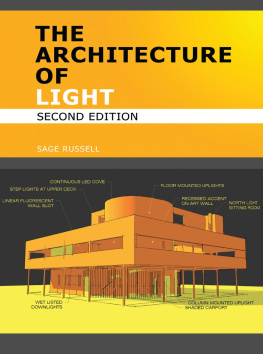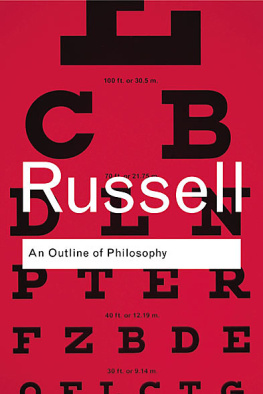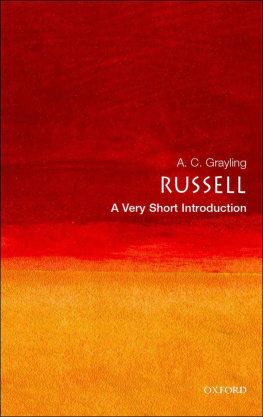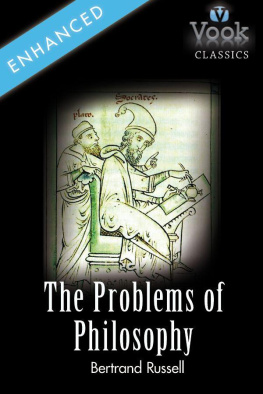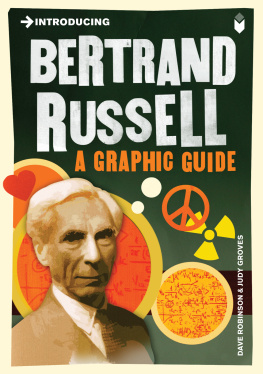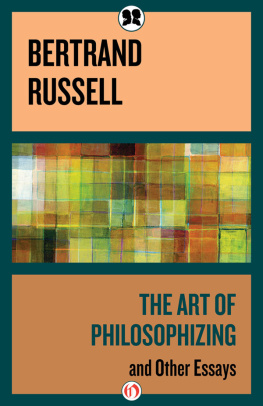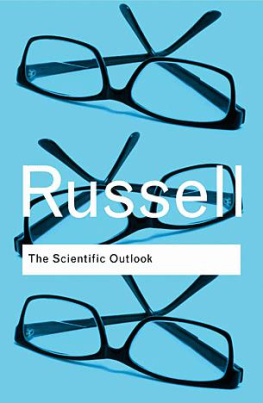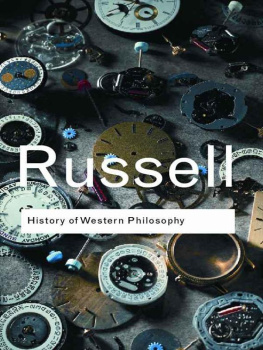MYSTICISM AND LOGIC AND OTHER ESSAYS
* * *
BERTRAND RUSSELL

*
Mysticism and Logic and Other Essays
From a 1917 edition
ISBN 978-1-775418-62-7
2010 The Floating Press
While every effort has been used to ensure the accuracy and reliability of the information contained in The Floating Press edition of this book, The Floating Press does not assume liability or responsibility for any errors or omissions in this book. The Floating Press does not accept responsibility for loss suffered as a result of reliance upon the accuracy or currency of information contained in this book. Do not use while operating a motor vehicle or heavy equipment. Many suitcases look alike.
Visit www.thefloatingpress.com
Contents
*
Preface
*
The following essays have been written and published at various times,and my thanks are due to the previous publishers for the permission toreprint them.
The essay on "Mysticism and Logic" appeared in the Hibbert Journalfor July, 1914. "The Place of Science in a Liberal Education" appearedin two numbers of The New Statesman, May 24 and 31, 1913. "The FreeMan's Worship" and "The Study of Mathematics" were included in aformer collection (now out of print), Philosophical Essays, alsopublished by Messrs. Longmans, Green & Co. Both were written in 1902;the first appeared originally in the Independent Review for 1903,the second in the New Quarterly, November, 1907. In theoreticalEthics, the position advocated in "The Free Man's Worship" is notquite identical with that which I hold now: I feel less convinced thanI did then of the objectivity of good and evil. But the generalattitude towards life which is suggested in that essay still seems tome, in the main, the one which must be adopted in times of stress anddifficulty by those who have no dogmatic religious beliefs, if inwarddefeat is to be avoided.
The essay on "Mathematics and the Metaphysicians" was written in 1901,and appeared in an American magazine, The International Monthly,under the title "Recent Work in the Philosophy of Mathematics." Somepoints in this essay require modification in view of later work.These are indicated in footnotes. Its tone is partly explained by thefact that the editor begged me to make the article "as romantic aspossible."
All the above essays are entirely popular, but those that follow aresomewhat more technical. "On Scientific Method in Philosophy" was theHerbert Spencer lecture at Oxford in 1914, and was published by theClarendon Press, which has kindly allowed me to include it in thiscollection. "The Ultimate Constituents of Matter" was an address tothe Manchester Philosophical Society, early in 1915, and was publishedin the Monist in July of that year. The essay on "The Relation ofSense-data to Physics" was written in January, 1914, and firstappeared in No. 4 of that year's volume of Scientia, anInternational Review of Scientific Synthesis, edited by M. EugenioRignano, published monthly by Messrs. Williams and Norgate, London,Nicola Zanichelli, Bologna, and Flix Alcan, Paris. The essay "On theNotion of Cause" was the presidential address to the AristotelianSociety in November, 1912, and was published in their Proceedingsfor 1912-13. "Knowledge by Acquaintance and Knowledge by Description"was also a paper read before the Aristotelian Society, and publishedin their Proceedings for 1910-11.
LONDON,
September, 1917
I - Mysticism and Logic
*
Metaphysics, or the attempt to conceive the world as a whole by meansof thought, has been developed, from the first, by the union andconflict of two very different human impulses, the one urging mentowards mysticism, the other urging them towards science. Some menhave achieved greatness through one of these impulses alone, othersthrough the other alone: in Hume, for example, the scientific impulsereigns quite unchecked, while in Blake a strong hostility to scienceco-exists with profound mystic insight. But the greatest men who havebeen philosophers have felt the need both of science and of mysticism:the attempt to harmonise the two was what made their life, and whatalways must, for all its arduous uncertainty, make philosophy, to someminds, a greater thing than either science or religion.
Before attempting an explicit characterisation of the scientific andthe mystical impulses, I will illustrate them by examples from twophilosophers whose greatness lies in the very intimate blending whichthey achieved. The two philosophers I mean are Heraclitus and Plato.
Heraclitus, as every one knows, was a believer in universal flux: timebuilds and destroys all things. From the few fragments that remain, itis not easy to discover how he arrived at his opinions, but there aresome sayings that strongly suggest scientific observation as thesource.
"The things that can be seen, heard, and learned," he says, "are whatI prize the most." This is the language of the empiricist, to whomobservation is the sole guarantee of truth. "The sun is new everyday," is another fragment; and this opinion, in spite of itsparadoxical character, is obviously inspired by scientific reflection,and no doubt seemed to him to obviate the difficulty of understandinghow the sun can work its way underground from west to east during thenight. Actual observation must also have suggested to him his centraldoctrine, that Fire is the one permanent substance, of which allvisible things are passing phases. In combustion we see things changeutterly, while their flame and heat rise up into the air and vanish.
"This world, which is the same for all," he says, "no one of gods ormen has made; but it was ever, is now, and ever shall be, anever-living Fire, with measures kindling, and measures going out."
"The transformations of Fire are, first of all, sea; and half of thesea is earth, half whirlwind."
This theory, though no longer one which science can accept, isnevertheless scientific in spirit. Science, too, might have inspiredthe famous saying to which Plato alludes: "You cannot step twice intothe same rivers; for fresh waters are ever flowing in upon you." Butwe find also another statement among the extant fragments: "We stepand do not step into the same rivers; we are and are not."
The comparison of this statement, which is mystical, with the onequoted by Plato, which is scientific, shows how intimately the twotendencies are blended in the system of Heraclitus. Mysticism is, inessence, little more than a certain intensity and depth of feeling inregard to what is believed about the universe; and this kind offeeling leads Heraclitus, on the basis of his science, to strangelypoignant sayings concerning life and the world, such as:
"Time is a child playing draughts, the kingly power is a child's."
It is poetic imagination, not science, which presents Time as despoticlord of the world, with all the irresponsible frivolity of a child. Itis mysticism, too, which leads Heraclitus to assert the identity ofopposites: "Good and ill are one," he says; and again: "To God allthings are fair and good and right, but men hold some things wrong andsome right."
Much of mysticism underlies the ethics of Heraclitus. It is true thata scientific determinism alone might have inspired the statement:"Man's character is his fate"; but only a mystic would have said:
"Every beast is driven to the pasture with blows"; and again:
"It is hard to fight with one's heart's desire. Whatever it wishes toget, it purchases at the cost of soul"; and again:

